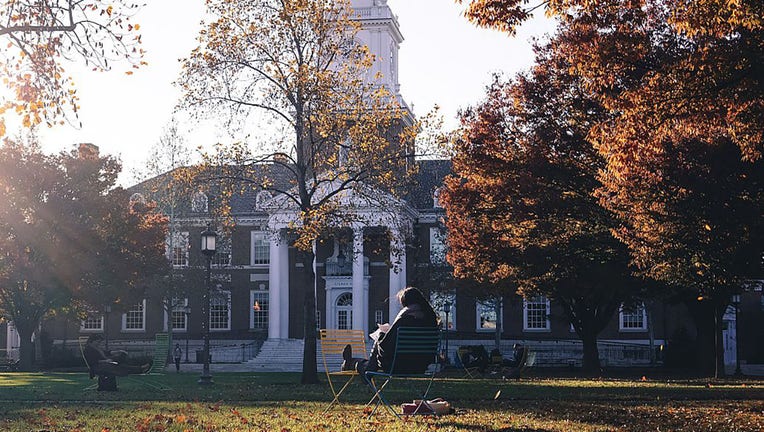Most Johns Hopkins medical students will no longer pay tuition

FILE - Students sit on lounge chairs studying in front of Gilman Hall on the leave-covered Keyser quadrangle on the Homewood campus of the Johns Hopkins University in Baltimore, Maryland, in 2015. (Photo by JHU Sheridan Libraries/Gado/Getty Images).
BALTIMORE - Most medical students at Johns Hopkins University will no longer pay tuition thanks to a $1 billion gift from Bloomberg Philanthropies, which was announced on Monday.
The donation will cover full tuition for medical students from families earning less than $300,000, starting in the fall.
Living expenses and fees will also be covered for students from families who earn up to $175,000.
Almost two-thirds of all students seeking a doctor of medicine degree from Johns Hopkins currently qualify for financial aid, according to Bloomberg Philanthropies – while 45% of the current class will also receive living expenses.
The school estimates that graduates’ average total loans will decrease from $104,000 currently to $60,279 by 2029.
The gift will also increase financial aid for students at the university's schools of nursing, public health, and other graduate schools.
"As the U.S. struggles to recover from a disturbing decline in life expectancy, our country faces a serious shortage of doctors, nurses, and public health professionals – and yet, the high cost of medical, nursing, and graduate school too often bars students from enrolling," Michael Bloomberg, founder of Bloomberg Philanthropies and Bloomberg LP, said in a statement.
"By reducing the financial barriers to these essential fields, we can free more students to pursue careers they’re passionate about – and enable them to serve more of the families and communities who need them the most," the statement added.
Bloomberg received a bachelor’s degree in electrical engineering from Johns Hopkins University in 1964.
The gift will go to John Hopkins' endowment and every penny will go directly to students, said Ron Daniels, president of Johns Hopkins University.
"Mike has really been moved by the challenges that the professions confronted during the course of the pandemic and the heroic efforts they’ve made to protecting and providing care to American citizens during the pandemic," Daniels said in an interview. "I think he simply wanted to recognize the importance of these fields and provide this support to ensure that the best and brightest could attend medical school and the school of nursing and public health."
Bloomberg Philanthropies previously gifted $1.8 billion to Johns Hopkins in 2018 to ensure that undergraduate students are accepted regardless of their family’s income.
Johns Hopkins is latest medical school to offer free tuition
Johns Hopkins will be the latest medical school to offer free tuition to most or all of their medical students.
Ruth Gottesman, a former professor at the Albert Einstein College of Medicine and the widow of a Wall Street investor, announced in February that she was donating $1 billion to the school. The gift meant that four-year students immediately received free tuition and all other students will be offered free tuition in the fall.
In 2018, Kenneth and Elaine Langone gave $100 million to the NYU Grossman School of Medicine to make tuition free for all current and future medical students through an endowment fund. The couple gave a second gift of $200 million in 2023 to the NYU Grossman Long Island School of Medicine to guarantee free tuition for all medical students. Kenneth Langone is a co-founder of Home Depot.
Other medical schools, like UCLA’s David Geffen School of Medicine, offer merit-based scholarships thanks to some $146 million in donations from the recording industry mogul, David Geffen. The Cleveland Clinic Lerner College of Medicine has also offered tuition-free education for medical students since 2008.
Candice Chen, associate professor, Milken Institute School of Public Health at The George Washington University, has researched the social missions of medical schools and had a strong reaction to the recent major gifts to John Hopkins, NYU and Albert Einstein.
"Collectively the medical schools right now, I hate to say this, but they’re failing in terms of producing primary care, mental health specialists as well as the doctors who will work in and serve in rural and underserved communities," Chen said.
Chen added that she would have loved to see this gift go to Meharry Medical College in Tennessee, for example, which is a historically Black school that has produced many primary care doctors who work in communities that have shortages.
Bloomberg granted Meharry Medical College $34 million in 2020 as part of a $100 million gift he made to four Black medical schools to help reduce the debt of their medical students for four years.
There have been only a handful of previous $1 billion donations to universities in the U.S., most coming in the past several years.
In 2022, the venture capitalist John Doerr and his wife, Ann, gave $1.1 billion to Stanford University for a new school focusing on climate change.
The small liberal arts school McPherson College has received two matching pledges since 2022 from an anonymous donor totaling $1 billion. The school, which has around 800 enrolled students, has a program for automotive restoration and is located 57 miles north of Wichita, Kansas.
Bloomberg, the former New York mayor, gave $3 billion to charities in 2023, making him one of the largest donors, according to research by the Chronicle of Philanthropy.
The Associated Press contributed to this report.

